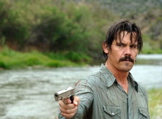
The loss of innocence in No Country for Old Men is so profound that you wish you could make off to a new land and start fresh. Ethan and Joel Coen examine America's moral landscape with a dusty prairie's long lens, riveting deathly silent close-ups, and master directing and editing (using their moniker Roderick Jaynes).
It's right vs. wrong, law vs. order, man vs. himself, illegal drugs, illegal aliens, illegal firearms; issues that still register from sea to shining sea, regardless that the movie is set in Texas in 1980. We've seen it before in such classics as In Cold Blood, Terrance Mallick's Badlands, and Oliver Stone's Natural Born Killers.
All of them pushed hot buttons in critics and audiences alike and all the beg the questions "Why do people kill?" and "How do we survive in a society after we have witnessed and then dissected such carnage?"
Josh Brolin's Llewelyn Moss is one of the last cowboys left on earth forced to swallow hard on the moral codes that others have fenced him in with. He is, after all, a Vietnam vet with convictions, and yet he isn't a dangerous psychopath, or is he? Did the things he witnessed in war crush his innocence, too? Definitely. Is he staying true to who he? Or taking the money he's stumbled upon on the Texas prairie (in the wake of a Mexican border drug exchange gone horribly wrong) and running with his wife from their trailer park world into a new and better life?
Watching this masterful and suspense-filled movie begs you to draw conclusions around every bend. Would you engage the enemy -- in this case the demonic killing machine Anton Chigurh (played brilliantly by Javier Bardem (The Sea Inside)), who uses a cattle prod to serve his needs -- that is more vile than Woody Harrelson's charismatic, media-savvy, bloodthirsty serial killer Micky Knox in the loss-of-innocence classic Natural Born Killers? (And by the way, how clever it was to cast Woody in a small part that certainly must be the Coens tipping their cowboy hats to Stone's film.) Anton's menacing scene with the old man at the gas station in the middle of nowhere is both terrifying and hilarious, but then again, human tragedy often forces us to laugh at the absurdity of violence. You'll never flip a coin again and not think of this movie and his character when you do. "Call it, Friend-o!"
And how about Tommy Lee Jones as sheriff Ed Tom Bell? He does more with his non-speaking presence than any movie you'll see this year. His creased and creviced face and soul-barring eyes convey the frustration that all of us feel while watching this taut and suspenseful story unfurl. Whether trying to nonchalantly explain to a young deputy the whys and hows at a crime scene or engaging his wife at a dinner table, he is riveting. He is the last of a dying breed that "didn't carry guns" when they became sheriffs. Nearing retirement, nearing the end of life, nearing the end of innocence on the prairie and wide-open expanse of America's final frontier.
Some reviewers have complained about the ending, but it's true to Cormac McCarthy's acclaimed novel and I'm all for depicting truth when transferring books to celluloid. Those looking for a pat Hollywood moving ending are probably too innocent for this cinematic masterpiece.
